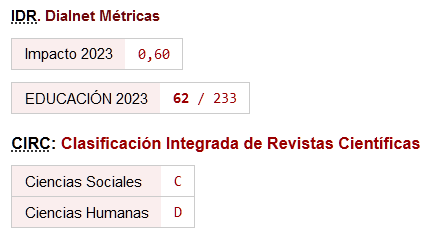La adicción a los teléfonos inteligentes y su impacto en la salud mental de los estudiantes
El papel de la calidad del sueño
DOI:
https://doi.org/10.46661/ijeri.10936Palabras clave:
Teléfono inteligente, Salud mental, Calidad del sueñoResumen
La adicción al teléfono móvil entre los estudiantes universitarios en China se ha convertido en una preocupación significativa, con un impacto creciente en la salud mental que ha captado la atención de los círculos académicos. Este estudio tiene como objetivo profundizar en la relación entre la adicción al teléfono móvil y la salud mental entre los estudiantes, explorando posibles mecanismos subyacentes. Se realizó una encuesta transversal exhaustiva con 581 estudiantes de la Universidad Huazhong en Wuhan, China, para evaluar este fenómeno. Nuestros hallazgos indican una correlación negativa entre la adicción al teléfono móvil y la salud mental. Además, la calidad del sueño parece actuar como un mediador parcial en esta relación, lo que sugiere que la mala calidad del sueño puede agravar los efectos adversos del uso excesivo del teléfono móvil en la salud mental. Estos resultados subrayan la necesidad urgente de que los administradores universitarios, los proveedores de atención médica y las familias reconozcan y aborden las implicaciones del uso excesivo del teléfono móvil entre los estudiantes. Este estudio contribuye a una mejor comprensión de cómo la adicción al teléfono móvil podría potencialmente alterar el bienestar mental en la población universitaria.
Descargas
Citas
Amiri, M., Dowran, B., Salimi, H., & Zarghami, M. H. (2020). The problematic use of mobile phone and mental health: A review study in Iran. Journal of Education and Health Promotion, 9 (1). https://doi.org/10.4103/jehp.jehp_268_20
Awinashe, M. V., Jain, A., Santhosh, V., Choudhury, B. K., Alessa, N., & Babaji, P. (2023). Smartphone addiction and its impact on knowledge, cognitive and psychomotor skills among dental students in India: An observational study. Journal of Education and Health Promotion, 12(1), 77. https://doi.org/10.4103/jehp.jehp_1330_22
Baumeister, R. F., Stillwell, A. M., & Heatherton, T. F. (1994). Guilt: an interpersonal approach. Psychological bulletin, 115(2), 243. https://doi.org/10.1037/0033-2909.115.2.243
Bertocchi, F. M., De Oliveira, A. C., Lucchetti, G., & Lucchetti, A. L. G. (2022). Smartphone use, digital addiction and physical and mental health in community-dwelling older adults: a population-based survey. Journal of medical systems, 46 (53), 1-10. https://doi.org/10.1007/s10916-022-01839-7
Billieux, J., Maurage, P., Lopez-Fernandez, O., Kuss, D. J., & Griffiths, M. D. (2015). Can disordered mobile phone use be considered a behavioral addiction? An update on current evidence and a comprehensive model for future research. Current Addiction Reports, 2(2), 156-162. https://doi.org/10.1007/s40429-015-0054-y
Buysse, D. (2003). The Pittsburgh sleep quality index: a new instrument for psychiatric practice and research. Psychiatry, 18, 498.
Buysse, D. J., Reynolds III, C. F., Monk, T. H., Berman, S. R., & Kupfer, D. J. (1989). The Pittsburgh Sleep Quality Index: a new instrument for psychiatric practice and research. Psychiatry research, 28(2), 193-213. https://doi.org/10.1016/0165-1781(89)90047-4
Caswell, J. J. (2023). Parental and Teacher Perceptions of Screen Time and Technology Use: Student Attention, Academic Performance and Social Interactions National University].
Chen, W.-Y., Yan, L., Yuan, Y.-R., Zhu, X.-W., Zhang, Y.-H., & Lian, S.-L. (2021). Preference for solitude and Mobile phone addiction among Chinese college students: the mediating role of psychological distress and moderating role of mindfulness. Frontiers in Psychology, 12, 750511. https://doi.org/10.3389/fpsyg.2021.750511
Di Nuovo, S. F., & Smeriglio, R. (2024). What kind of addiction is Internet abuse? Similarities and differences between substance and behavioral addictions. Addiction & Social Media Communication, 1(1), 13-23.
Dickinson, D. L., & Masclet, D. (2023). Unethical decision making and sleep restriction: Experimental evidence. Games and Economic Behavior, 141, 484-502. https://doi.org/10.1016/j.geb.2023.07.004
Elhai, J. D., Gallinari, E. F., Rozgonjuk, D., & Yang, H. (2020). Depression, anxiety and fear of missing out as correlates of social, non-social and problematic smartphone use. Addictive behaviors, 105, 106335. https://doi.org/10.1016/j.addbeh.2020.106335
Gan, Y., Zhang, T., Zhang, J., Wu, X., & Shao, M. (2022). Impact of mobile game addiction tendency on Chinese university students: A hierarchical linear modeling study. Frontiers in Psychology, 13, 937446. https://doi.org/10.3389/fpsyg.2022.937446
Goldberg, D. P., & Williams, P. (1988). A user's guide to the General Health Questionnaire. NFER-NELSON.
Hallauer, C. J., Rooney, E. A., Billieux, J., Hall, B. J., & Elhai, J. (2022). Mindfulness mediates relations between anxiety with problematic smartphone use severity. Cyberpsychology: Journal of Psychosocial Research on Cyberspace, 16(1), 1-17. https://doi.org/10.5817/CP2022-1-4
He, J.-w., Tu, Z.-h., Xiao, L., Su, T., & Tang, Y.-x. (2020). Effect of restricting bedtime mobile phone use on sleep, arousal, mood, and working memory: a randomized pilot trial. Plos one, 15(2), e0228756. https://doi.org/10.1371/journal.pone.0228756
Hong, Y.-J. (2021). The structural relationships among adolescents’ mobile phone dependency, trajectories of depression, and self-regulated learning abilities. Human Ecology Research, 59(3), 341-351. https://doi.org/10.6115/fer.2021.025
Jiang, M., & Han, X. (2024). Communications, media and internet concentration in China, 2019-2021. Available at SSRN 4854495. https://doi.org/10.22215/gmicp/2024.5.19.3
Kang, Y., Liu, S., Yang, L., Xu, B., Lin, L., Xie, L., Zhang, W., Zhang, J., & Zhang, B. (2020). Testing the bidirectional associations of mobile phone addiction behaviors with mental distress, sleep disturbances, and sleep patterns: a one-year prospective study among Chinese college students. Frontiers in psychiatry, 11, 634. https://doi.org/10.3389/fpsyt.2020.00634
Keyvanfar, A., Mohseny, M., Zamani, A., Derisi, M., Soheili, A., Seyedalhosseini, Z., & Shamekhi-Amiri, F. (2022). Association between Sleep Quality and Mental Health among Medical Students in a University Center in Tehran, Iran. International Journal of Body, Mind & Culture (2345-5802), 9(1), 37–44. https://doi.org/10.22122/ijbmc.v9i1.344
Krystal, A. D., & Edinger, J. D. (2008). Measuring sleep quality. Sleep medicine, 9, S10-S17. https://doi.org/10.1016/S1389-9457(08)70011-X
Kwon, M., Lee, J.-Y., Won, W.-Y., Park, J.-W., Min, J.-A., Hahn, C., Gu, X., Choi, J.-H., & Kim, D.-J. (2013). Development and validation of a smartphone addiction scale (SAS). Plos one, 8(2), e56936. https://doi.org/10.1371/journal.pone.0056936
Lei, L. Y.-C., Ismail, M. A.-A., Mohammad, J. A.-M., & Yusoff, M. S. B. (2020). The relationship of smartphone addiction with psychological distress and neuroticism among university medical students. BMC psychology, 8, 1-9. https://doi.org/10.1186/s40359-020-00466-6
Li, Y., Li, G., Liu, L., & Wu, H. (2020). Correlations between mobile phone addiction and anxiety, depression, impulsivity, and poor sleep quality among college students: A systematic review and meta-analysis. Journal of behavioral addictions, 9(3), 551-571. https://doi.org/10.1556/2006.2020.00057
Liu, D., Kahathuduwa, C., & Vazsonyi, A. T. (2021). The Pittsburgh Sleep Quality Index (PSQI): Psychometric and clinical risk score applications among college students. Psychological Assessment, 33(9), 816. https://doi.org/10.1037/pas0001027
Liu, M., & Lu, C. (2022). Mobile phone addiction and depressive symptoms among Chinese University students: The mediating role of sleep disturbances and the moderating role of gender. Frontiers in public health, 10, 965135. https://doi.org/10.3389/fpubh.2022.965135
Ma, S., Bi, X., Cui, H., & Ma, Y. (2024). Parental phubbing and mobile phone addiction among Chinese adolescents: a moderated mediation model. Frontiers in Psychology, 15, 1379388. https://doi.org/10.3389/fpsyg.2024.1379388
Mahfouz, M. S., Ali, S. A., Bahari, A. Y., Ajeebi, R. E., Sabei, H. J., Somaily, S. Y., Madkhali, Y. A., Hrooby, R. H., & Shook, R. a. N. (2020). Association between sleep quality and physical activity in Saudi Arabian University students. Nature and Science of Sleep, 775-782. https://doi.org/10.2147/NSS.S267996
Mirzaei, S., Akbarian, M. J., Damyar, S., & Tajik, R. (2022). The degree of dependence on mobile phones and its relationship with sleep quality in students of Bam university of medical sciences in 2020. Health and Development Journal, 11(3), 123-128. https://doi.org/10.34172/jhad.92346
Olson, J. A., Sandra, D. A., Colucci, É. S., Al Bikaii, A., Chmoulevitch, D., Nahas, J., Raz, A., & Veissière, S. P. (2022). Smartphone addiction is increasing across the world: A meta-analysis of 24 countries. Computers in Human Behavior, 129, 107138. https://doi.org/10.1016/j.chb.2021.107138
Rigamonti, L. (2023). Use of digital media for remote instruction in exercise sciences education and research. Universität Potsdam.
Sohn, S. Y., Rees, P., Wildridge, B., Kalk, N. J., & Carter, B. (2019). Prevalence of problematic smartphone usage and associated mental health outcomes amongst children and young people: a systematic review, meta-analysis and GRADE of the evidence. Bmc Psychiatry, 19, 1-10. https://doi.org/10.1186/s12888-019-2350-x
Thangavel, V. (2024). Nomophobia in India: A psychological disorder that causes the brain to release dopamine in response to tweets, emoticons, and other acts, rewarding the behavior and sustaining the habit of using social media addiction. Curr Trends Mass Comm, 3(1), 01-16. https://doi.org/10.23880/nnoaj-16000187
Ting, C. H., & Chen, Y. Y. (2020). Smartphone addiction. In C. A. Essau & P. H. Delfabbro (Eds.), Adolescent addiction (2nd ed., pp. 215–240). Elsevier Academic Press. https://doi.org/10.1016/B978-0-12-818626-8.00008-6
Vaziri-Harami, R., Heidarzadeh, F., & Kheradmand, A. (2021). Relationship between mobile phone addiction and narcissistic personality disorder among medical students. Archives of Clinical Psychiatry, 48(1), 24-28.
Wang, Y., Yang, H., Montag, C., & Elhai, J. D. (2020). Boredom proneness and rumination mediate relationships between depression and anxiety with problematic smartphone use severity. Current Psychology, 1-11. https://doi.org/10.1007/s12144-020-01052-0
Wei, J., Dang, J., Mi, Y., & Zhou, M. (2024). Mobile phone addiction and social anxiety among Chinese adolescents: Mediating role of interpersonal problems. Anales de Psicología/Annals of Psychology, 40(1), 103-109. https://doi.org/10.6018/analesps.381801
Wu, J., & Siu, A. C. (2020). Problematic mobile phone use by Hong Kong adolescents. Frontiers in Psychology, 11, 551804. https://doi.org/10.3389/fpsyg.2020.551804
Wu, W., Chen, Y., Shi, X., Lv, H., Bai, R., Guo, Z., Yu, L., Liu, Y., Liu, J., & Chen, Y. (2022). The Mobile phone addiction and Depression among High School students: the Roles of Cyberbullying victimization, perpetration, and gender. Frontiers in Psychology, 13, 845355. https://doi.org/10.3389/fpsyg.2022.845355
Xue, Y., Dong, Y., Luo, M., Mo, D., Dong, W., Zhang, Z., & Liang, H. (2018). Investigating the impact of mobile SNS addiction on individual’s self-rated health. Internet Research, 28(2), 278-292. https://doi.org/10.1108/IntR-05-2017-0198
Yang, L.-L., Guo, C., Li, G.-Y., Gan, K.-P., & Luo, J.-H. (2023). Mobile phone addiction and mental health: the roles of sleep quality and perceived social support. Frontiers in Psychology, 14, 1265400. https://doi.org/10.3389/fpsyg.2023.1265400
Zhang, D., Yang, Y., & Guan, M. (2024). A cross-lagged analysis of the relationship between short video overuse behavior and depression among college students. Frontiers in Psychology, 15, 1345076. https://doi.org/10.3389/fpsyg.2024.1345076
Zhang, M. X., & Wu, A. M. (2020). Effects of smartphone addiction on sleep quality among Chinese university students: The mediating role of self-regulation and bedtime procrastination. Addictive behaviors, 111, 106552. https://doi.org/10.1016/j.addbeh.2020.106552
Zhang, Y., Li, Y., Xia, M., Han, M., Yan, L., & Lian, S. (2023). The relationship between loneliness and mobile phone addiction among Chinese college students: The mediating role of anthropomorphism and moderating role of family support. Plos one, 18(4), e0285189. https://doi.org/10.1371/journal.pone.0285189
Zou, L., Wu, X., Tao, S., Xu, H., Xie, Y., Yang, Y., & Tao, F. (2019). Mediating effect of sleep quality on the relationship between problematic mobile phone use and depressive symptoms in college students. Frontiers in psychiatry, 10, 822. https://doi.org/10.3389/fpsyt.2019.00822
Descargas
Archivos adicionales
Publicado
Cómo citar
Número
Sección
Licencia
Derechos de autor 2024 Irum Zeb, Aashiq Khan, Zhan Yan

Esta obra está bajo una licencia internacional Creative Commons Atribución-NoComercial-SinDerivadas 4.0.












